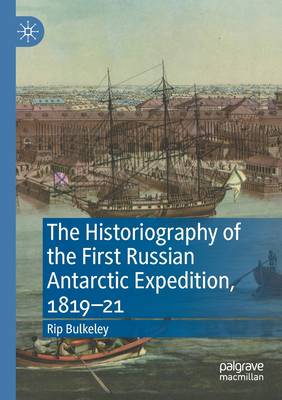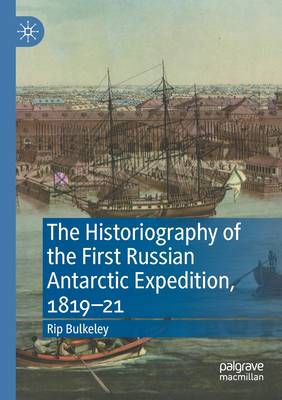
Door een staking bij bpost kan je online bestelling op dit moment iets langer onderweg zijn dan voorzien. Dringend iets nodig? Onze winkels ontvangen jou met open armen!
- Afhalen na 1 uur in een winkel met voorraad
- Gratis thuislevering in België vanaf € 30
- Ruim aanbod met 7 miljoen producten
Door een staking bij bpost kan je online bestelling op dit moment iets langer onderweg zijn dan voorzien. Dringend iets nodig? Onze winkels ontvangen jou met open armen!
- Afhalen na 1 uur in een winkel met voorraad
- Gratis thuislevering in België vanaf € 30
- Ruim aanbod met 7 miljoen producten
Zoeken
The Historiography of the First Russian Antarctic Expedition, 1819-21
Rip Bulkeley
Paperback | Engels
€ 94,95
+ 189 punten
Uitvoering
Omschrijving
This book looks at the different ways in which Russian historians and authors have thought about their country's first Antarctic expedition (1819-21) over the past 200 years. It considers the effects their discussions have had on Russia's Antarctic policy and may yet have on Antarctica itself. In particular, it examines the Soviet decision in 1949, in line with the cultural policies of late Stalinism, to revise the traditional view of the expedition in order to claim that it was Russian seamen that first sighted the Antarctic mainland in January 1820; this claim remains the official position in Russia today. The author illustrates, however, that the case for such a claim has never been established, and that attempts to make it damaged the work of successive Russian historians. Providing a timely assessment of Russian historiography of the Bellingshausen expedition and examining the connections between the priority claim and national policy goals, this book represents animportant contribution to the history of the Antarctic.
Specificaties
Betrokkenen
- Auteur(s):
- Uitgeverij:
Inhoud
- Aantal bladzijden:
- 324
- Taal:
- Engels
Eigenschappen
- Productcode (EAN):
- 9783030595487
- Verschijningsdatum:
- 28/04/2022
- Uitvoering:
- Paperback
- Formaat:
- Trade paperback (VS)
- Afmetingen:
- 148 mm x 210 mm
- Gewicht:
- 417 g

Alleen bij Standaard Boekhandel
+ 189 punten op je klantenkaart van Standaard Boekhandel
Beoordelingen
We publiceren alleen reviews die voldoen aan de voorwaarden voor reviews. Bekijk onze voorwaarden voor reviews.











